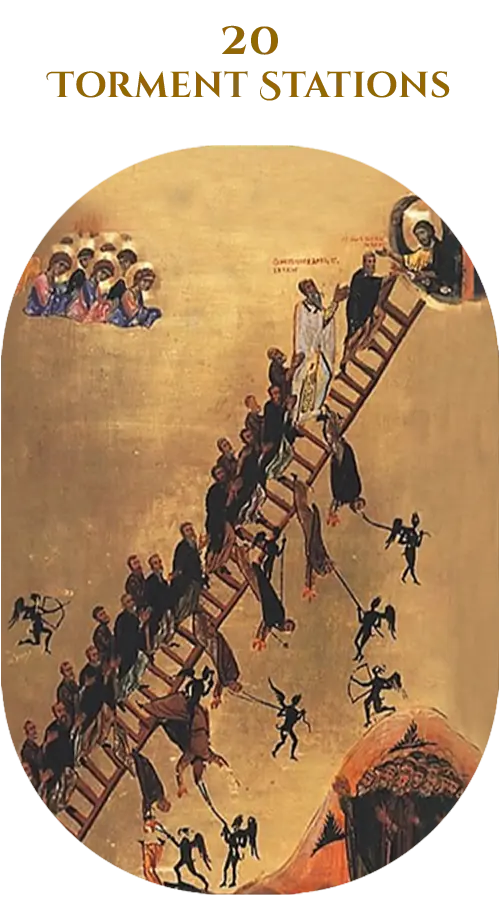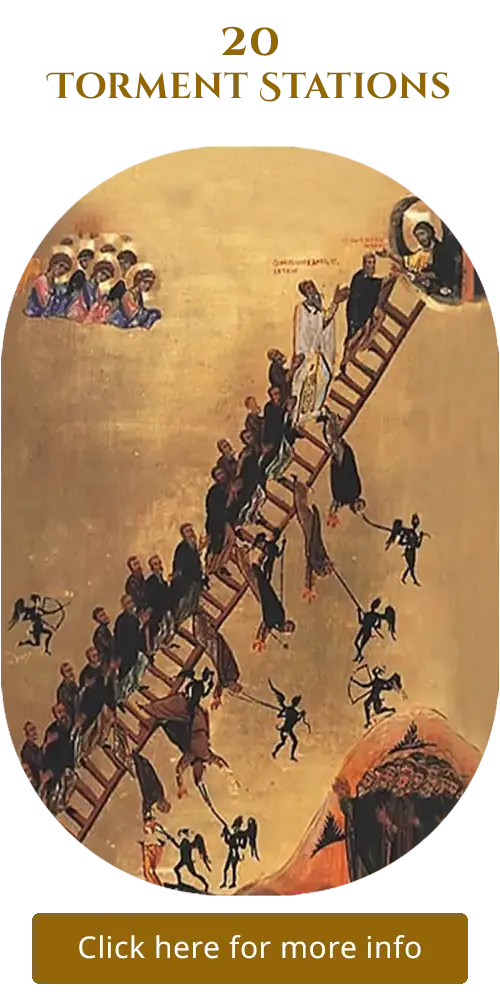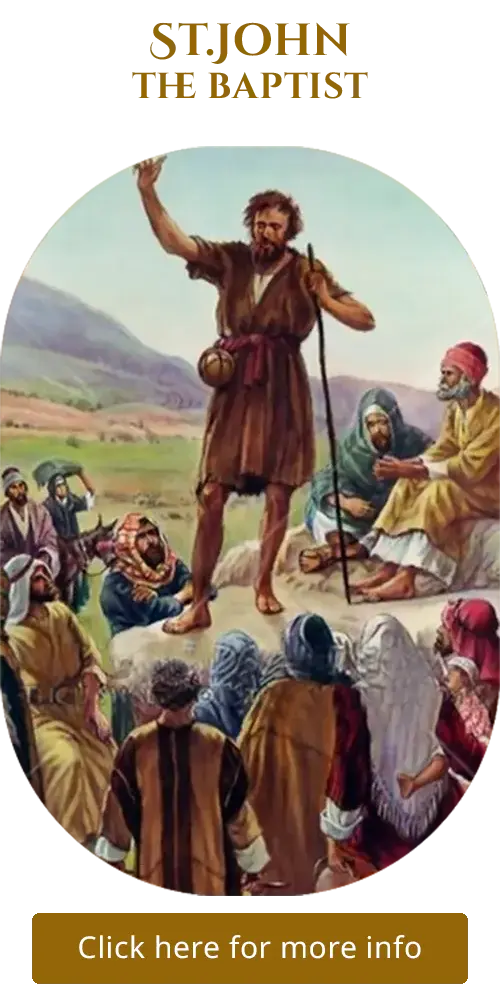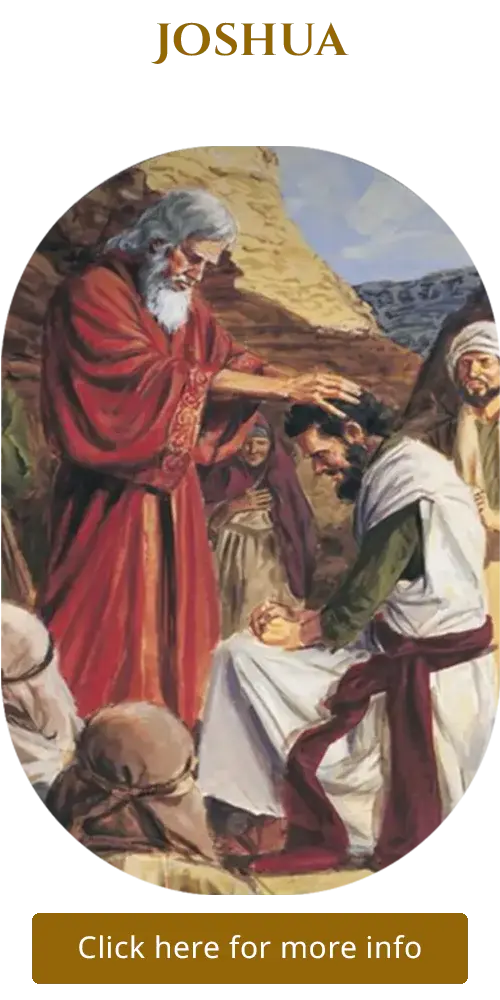St. Barthlomew
Outside Paintings - North Wall
20 Stations of Torment
In the rich tradition of the Eastern Orthodox Church, particularly through the ascetic writings and teachings of revered elders like Fr. Seraphim Rose, we encounter the mystical concept of the 20 Aerial Toll Houses—often referred to as “torment stations” or “testing places.” While not formal dogma, this teaching is deeply rooted in patristic writings and the lives of saints, such as St. Basil the New, and serves as a profound spiritual metaphor for the soul’s journey after death.
According to this tradition, after departing the body, the soul embarks on a passage through twenty spiritual stations. At each toll house, the soul is confronted by accusing demons who scrutinize it for specific sins, such as pride, envy, gluttony, fornication, or slander. The soul is not alone in this trial; its guardian angel and the prayers of the faithful provide crucial support. These toll houses underscore the weight of unrepented sin and emphasize the importance of spiritual vigilance and repentance during our earthly life.
While there is no specific icon dedicated solely to the toll houses, the renowned Icon of the Ladder of Divine Ascent, inspired by St. John Climacus, offers a parallel vision. This icon depicts monks striving upward toward Christ, with demons attempting to pull down those who succumb to temptation. The image vividly captures the spiritual struggle against passions and demonic forces, mirroring the soul’s postmortem journey through the toll houses.
Ultimately, the teaching of the Aerial Toll Houses calls every believer to a life of deep repentance, humility, and watchfulness, relying on Christ’s mercy and the intercession of the saints to guide us toward eternal life.



1st Torment: Idle Speech
At the first torment, souls are confronted by spirits who accuse them of idle, thoughtless, or blasphemous speech. Every careless word spoken – whether in anger, jest, or impurity – is recorded, including the time, place, and company in which they were uttered. The soul is held accountable for unconfessed sins, but the holy angels offer good deeds to ransom the soul, allowing passage to the next station.
2nd Torment: Lying
The second station tests every lie, broken oath, vain use of God’s name, and insincere confession. The ruthless spirits here scrutinize the soul for even minor falsehoods or insincere repentance due to shame. Through Christ’s grace and the intercession of a spiritual father, the soul is redeemed with good deeds and moves forward.
3rd Torment: Slander and Evil Speech
This torment punishes those who speak evil of others, spread rumours, or judge their neighbours. Such sins are considered antichrist-like, as they usurp Christ’s role as judge. The soul, having strived to avoid condemning or maligning others, is spared through the prayers, despite minor lapses in thought or careless agreement with others’ slander.
4th Torment: Gluttony
At the station of gluttony, demons resembling sensuous gluttons and drunkards accuse the soul of excessive eating or drinking, especially in secret or before prayer. Records of every instance of overindulgence are presented, but the holy angels ransom the soul with good deeds and almsgiving, combined with prayers, overcoming the demons’ accusations.
5th Torment: Sloth
The torment of sloth holds accountable those who wasted time in idleness, lived off others’ labor, or neglected church services and the salvation of their souls. The soul, accused of much, is freed by the angels using good deeds and intercession of Saints to balance its deficiencies.
6th Torment: Stealing
Thieves are accused, but minor childhood infractions may require only a small ransom. The soul passes quickly if no significant theft is found.
7th Torment: Avarice and Love of Money
Love of money and greed are judged here. Contentment with God’s provisions allows the soul to pass without hindrance.
8th Torment: Usury
At the station of usury, those who exploit others through unjust financial gain are accused. The soul, free of such sins, passes without hindrance, praising God.
9th Torment: Injustice
The torment of injustice punishes unjust judges, deceitful merchants, and those who withhold fair wages. The soul, with minimal guilt, is freed with a small offerings.
10th Torment: Envy
The station of envy tests for hatred, unfriendliness, or lack of love toward others. The soul, innocent of these sins through Christ’s mercy, passes freely, untouched by the demons’ savagery.
11th Torment: Pride
Here, the soul faces accusations of vanity, self-reliance over God, and disobedience to parents or authorities. Humility and minimal sins allow passage with little ransom.
12th Torment: Anger and Ruthlessness
The torment of anger is overseen by a ruthless prince who accuses the soul of angry words, looks, or harsh punishments. The angels counter with treasures from Basil, redeeming the soul from its recorded sins.
13th Torment: Bearing Grudges
This station punishes those who harbor evil thoughts or return evil for evil. The soul, having shown love and meekness toward offenders, passes without payment, joyful in God’s mercy.
14th Torment: Murder
The torment of murder accuses not only robbers but also those who have harmed others through blows or shoves. A small ransom is paid, and the soul moves on.
15th Torment: Magic and Sorcery
The station of magic, with its serpent-like demons, tests for sorcery, poisoning, or incantations. Finding no such sins, the soul passes freely, despite the demons’ taunts about the upcoming torment of fornication.
16th Torment: Fornication
This torment accuses souls of lustful thoughts, impure glances, and passionate touches, not just physical fornication. The demons present detailed records of past sins, but the angels counter with the soul’s later purity and Basil’s treasures, narrowly securing its freedom.
17th Torment: Adultery
The station of adultery punishes marital infidelity and broken vows of purity. The soul, heavily accused, is rescued with difficulty through Basil’s treasures, as its good deeds alone are insufficient.
18th Torment: Sodomic Sins
This revolting station accuses souls of unnatural sins and incest. The soul, free of such sins by God’s grace, passes without issue, as the demons flee in shame.
19th Torment: Heresies
The torment of heresies tests for false beliefs, doubts, or denial of holy things. The soul, steadfast in orthodox faith, passes without being tested, nearing the gates of Heaven.
20th Torment: Lack of Compassion
The final torment, overseen by a cruel prince, punishes mercilessness and cruelty of heart. Even the most devout are cast into hell if unmerciful, but the soul passes with ease, aided by Basil’s prayers, and approaches Heaven’s gates.






